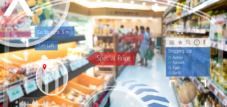Controversial concept: The debate about the Sunday opening of autonomous smart stores
Autonomous smart stores, also known as “Walk-in-Stores,” revolutionize the shopping experience and enable customers to independently buy any staff. The transactions are handled via a dedicated app, while cameras automatically record the entire purchase process. Examples of such supermarkets are Rewe's “Nahkaufbox” and Tegut as well as the “Aunt-M” or “Aunt Enzo” markets. This self -sufficient self -employed and without personnel working shops replace increasingly closed supermarkets and can be found at various locations such as train stations, in cities and rural areas. Since you do not need a staff, you are usually opened every day until late at night.
However, there is resistance to this concept on the part of the “Allianz for Free Sunday”, consisting of unions and churches. You believe that smart stores should only be open from Monday to Saturday. Allianz argues that the regular opening of numerous small business on Sundays could affect the constitutionally protected right to a working -free Sunday. In contrast, the operators of the smart stores claim that opening on Sundays is essential for their economic livelihood.
The regulations regarding the Sunday openings vary depending on the German state. While Baden-Württemberg and Rhineland-Palatinate allow them, Bavarian operators need approval from the municipality, and small businesses are limited by the holiday law and are not allowed to open on Sundays. If the “Alliance for Free Sonntag” enforced with its demands, many business operators in rural areas could have difficulty operating such supermarkets profitably.
Autonomous Smart Stores: More Efficient, More Convenient and No Staff - The Future of Shopping?
The advantages of autonomous smart stores
Autonomous smart stores offer a variety of benefits for customers and operators. For consumers, this means a convenient and flexible shopping experience. Thanks to the dedicated app, customers can shop around the clock without having to rely on opening times. This is particularly beneficial for people with irregular working hours or commuting professionals who don't always have the opportunity to shop during traditional business hours.
In addition, smart stores enable purchases to be processed efficiently and in a time-saving manner. Since there are no checkout lines, customers can simply scan their items and pay directly without having to wait long for the checkout process. This results in a seamless shopping experience that reduces the stress and hassle of traditional supermarkets.
The challenges and concerns
Despite the many benefits that autonomous smart stores offer, there are also some challenges and concerns that need to be considered. One of the main concerns is the potential loss of retail jobs. If traditional supermarkets are replaced by smart stores, this could lead to a decline in job opportunities for salespeople and cashiers. It is therefore important to find solutions that strike a balance between automation and preserving jobs in retail.
Another concern concerns data security and customer privacy. Since smart stores are equipped with cameras to monitor purchases, operators must ensure that the data collected is adequately protected and does not fall into the wrong hands.
human factor
In a well-thought-out system, the human factor should not be ignored. As great as the technical possibilities are, the sociological aspect of human coexistence is also taken into account. The face of autonomy is not the machine, but still the human being.
In an Autonomous Retail Systems (ARS) (see also below in the next section), in addition to the information center (service station), cashiers and employees can also be found in the aisles. Even if only during the usual opening hours, it is still a humane overall concept. Jobs will not be eliminated and the shopping experience will not be leveled; it has been optimized for the future for both suppliers and customers.
The future of autonomous smart stores
Despite the current controversies and challenges, autonomous smart stores undoubtedly have the potential to shape the future of retail. As technology advances and consumer acceptance grows, smart stores could become an integral part of everyday shopping.
It is important that both customer interests and employee concerns are taken into account to ensure a balanced and sustainable development of these innovative purchasing concepts. By using technology responsibly and carefully weighing the pros and cons, Autonomous Smart Stores can add value to society and take retail into the future.
Autonomous smart stores a promising perspective for retail. By providing a convenient and efficient shopping experience, they can establish themselves as an integral part of modern life. Nevertheless, it is crucial to keep an eye on the possible challenges and concerns and to respond responsibly to these innovative developments. This is the only way to ensure a sustainable future for retail and society as a whole.
Suitable for:
Xpert.Plus warehouse optimization - high-bay warehouses such as pallet warehouses consulting and planning
The Autonomous Retail System (ARS) - The birth of autonomous retail
➡️ The Autonomous Retail System (ARS) was the groundbreaking concept that laid the foundation for the emergence of various smart store variants. It revolutionized retail by leveraging automation and autonomization to improve customer experience and operational efficiency alike. The idea behind the ARS was to create a seamless shopping experience where customers could shop autonomously and self-determined.
The different Smart Store variants
Following the success of the ARS, various companies and retailers began developing different variations of it to meet the individual needs of customers and the demands of the market. Here are some of the notable variants:
Autonomous Smart Stores
These business models are based on the ARS and offer a similar shopping experience. Customers can navigate stores, select products and pay using smart shopping carts or mobile apps. Some advanced autonomous smart stores also use facial recognition and AI technologies to provide personalized recommendations.
Walk In Store with Scan & Go
A walk in store is a physical retail store that offers customers the opportunity to enter and shop without making an appointment. Unlike online stores, customers in the walk-in store can enjoy the shopping experience, receive personal advice from employees and take products with them immediately without having to wait for delivery. The walk-in store is therefore a traditional retail method that offers customers a haptic and immediate shopping experience.
At Walk In Stores with Scan & Go, the focus is on the simplicity and efficiency of the shopping process. There are usually no more information centers or human cashiers here. Customers can simply walk into the store, scan products and pay for their selections via an app or the scanner and leave the store without waiting. This model aims to reduce operational costs and enable quick turnaround.
Scan & Go is a modern retail technology that allows customers to scan and pay for their purchases in-store independently, without queuing at the traditional checkout. The process is simple: the customer uses a smartphone or a special hand-held scanner to scan the barcodes of the products as they place them in their shopping cart. The items are automatically saved in a shopping list and the total price updates in real time. Once the customer has finished shopping, they pay the total amount directly via the app or scanner and leave the store without having to wait in line at the checkout. Scan & Go saves time and offers customers a faster and more convenient shopping experience.
It is important to note that this technology may be implemented differently in different stores and countries. Some stores allow you to place items in bring-your-own bags, while others require final checks by staff to prevent theft.
Pick & Go or Just Walk Out Stores
The “Just Walk Out” technology uses artificial intelligence, image detection and sensors in business to record the articles, select and move customers. Before entering the branch, customers must use a mobile app that processes personal information and payment preferences. When shopping, customers scan a code when entering, items are automatically added to the virtual shopping cart. The automatic credit card payment takes place when you leave the business. A shopping receipt can optionally be requested by email.
Unmanned Smart Stores
This variant goes one step further and relies entirely on the autonomy of the business. Unmanned smart stores are often small units that can be placed in busy areas, shopping centers or even public transport. Customers can select products, pay, and enter or exit the store without the need for human staff.
Personal Smart Stores
In contrast to fully autonomous models, personal smart stores still have a minimum number of human staff. However, these employees are not tied to cash registers, but rather serve as customer advisors or experts in specific product categories. The focus here is on providing expertise and a personalized shopping experience.
The crucial difference – customer experience vs. cost reduction
The key difference between the ARS and the various Smart Store variants is the emphasis on customer experience and autonomy. While the ARS aims to provide customers with a seamless and personal shopping experience, the other models focus more on cost reduction and efficiency for retailers.
The ARS maintains human interactions by incorporating information centers and human cashiers to assist the customer when needed and add a personal element. The other variants, such as unmanned smart stores and walk-in stores, largely forego human interaction in order to minimize operating costs and speed up the purchasing process.
While the ARS remains attractive to retailers seeking a superior customer experience, the other variants offer a cost-effective solution, particularly in high-traffic areas or for fast-moving products.
News and developments
Since the introduction of the ARS, many companies have jumped on the bandwagon and developed their own Smart Store variants. This has led to a growing variety of autonomous retail concepts that are continually influencing and evolving the market.
Some of the recent developments include the use of cutting-edge technologies such as Augmented Reality (AR) and Virtual Reality (VR) to further improve the shopping experience. Customers can virtually try out products and see how they would look in their home or environment before making a purchasing decision.
More on this in connection with the matrix code, which is scheduled to be used worldwide in 2027:
Furthermore, some smart stores have started to provide their technology platforms to other retailers, which leads to a kind of “smart store as a service” model. In this way, even smaller retailers can benefit from the advantages of autonomy and automation without having to make enormous investments in the technology.
The development of ARS and the various Smart Store variants is far from complete. The industry continues to be driven forward by innovative ideas and technologies, and autonomous retail is expected to see many more exciting developments in the coming years.
The basic consideration in developing the ARS business model
The basic idea behind the ARS is that some people might shy away from a completely autonomous store. The human aspect, the relationship and interaction with shop staff play an important role in traditional retail and create a feeling of familiarity and personal care. With fully autonomous stores, some customers may feel that something essential is missing - the human touch.
The lack of a breakthrough in autonomous businesses so far may be due to the fact that the transition from traditional, labor-intensive businesses to fully automated facilities still seems too abrupt for many people. Changing customer habits and expectations often takes time, and adoption of new technologies takes time to become established.
However, things could change in the coming years. As society gradually gets used to modern concepts such as autonomous shopping, the barriers and reservations towards fully autonomous shops could gradually be reduced. Advances in technology and retailers' ongoing efforts to improve the customer experience could also help autonomous business models become more attractive in the future.
Increasing digitalization and automation in many aspects of everyday life could also contribute to people becoming more open to modern retail concepts. Increasing familiarity with self-driving cars, artificial intelligence and other technologies could help autonomous businesses become a natural part of our everyday lives.
However, it remains to be seen exactly how acceptance for autonomous business models will develop. Retailers must continue to focus on finding the right balance between automation and personal customer service to meet customer needs and expectations.
The transition to fully autonomous stores will be a gradual process that requires time and adaptation. However, as technology advances and acceptance of modern concepts grows, autonomous business models could play an increasingly larger role in retail in the coming years. It remains exciting to see how this innovative way of shopping continues to develop and be integrated into people's everyday lives.
Micro-Hub – The key, ingenious solution?
Logistics never stops. One challenge follows another. Warehouse optimization, process acceleration, cost efficiency, CO2 reduction, automation and competitive pressure. The main driver of this development is e-commerce.
The requirements for micro hubs already exist in Germany!
Converting the central warehouses of retail companies or logistics centers into micro-hubs would be possible without any major problems. To start with, it is enough to expand just one part of the micro-fulfillment area and adapt it to the market using scaling solutions. For example, existing grocery chains can be converted into micro-hubs or a part of them can be converted into a micro-fulfillment solution.
Concept: Autonomous and automated retail systems central warehouse logistics center/e-commerce image: Xpert.Digital
More about it here:
Xpert.plus-logistics advice and logistics optimization-industry expert, here with its own 'Xpert.digital Industrie-Hub' of over 1,500 specialist contributions
Xpert.Plus is a project from Xpert.Digital. We have many years of experience in supporting and advising on storage solutions and in warehouse optimization, which we bundle in a large network under Xpert.Plus.
I would be happy to serve as your personal advisor.
You can contact me by filling out the contact form below or simply call me on +49 89 89 674 804 (Munich) .
I'm looking forward to our joint project.
Xpert.Digital – Konrad Wolfenstein
Xpert.Digital is a hub for industry with a focus on digitalization, mechanical engineering, logistics/intralogistics and photovoltaics.
With our 360° business development solution, we support well-known companies from new business to after sales.
Market intelligence, smarketing, marketing automation, content development, PR, mail campaigns, personalized social media and lead nurturing are part of our digital tools.
You can find out more at: www.xpert.digital – www.xpert.solar – www.Xpert.Plus



